***
The Dead Sea Scroll and the Ancient World (Part 1)
Part 2
1.5 weeks after it closed, 3 weeks after I went and long after everyone else has put up their photos and comments, here's my review of the "The Dead Sea Scroll and the Ancient World" exhibition, which I went to despite Paul's damning indictment (I wanted to see the lies and half-truths):

Crowd queuing up. I managed to get a group ticket off one group which offered a spare to me.
Before we were allowed to look at the exhibition, we were herded into a room where we watched a video with bad sound, where a "Biblical Archaeologist" droned on. A "Biblical Archaeologist" is like a "Christian Scientist" (i.e. a practitioner of "Christian Science") or a "Marxist Economist".
We were also given a handout - a printout of the Wikipedia article for the scrolls. How cheapskate.
The exhibition was divided into 3 rooms, and in each a talk was given at random intervals, so I went for all 3. As some have pointed out, the name was misleading as it was mostly an exhibition of Bibles and a glorification of the Bible, so they had lots of rubbish to say; indeed, the only bits of the "Ancient World" (which I define as before the Fall of Rome) in the exhibition were the scroll fragments and some clay products, and almost everything else dated from the Renaissance and later.
The first talk was by a "Dr David Byrd". Casual digging did not let me uncover the source of his Ph.D, but the church he presumably belongs to (Folsom Point church of Christ) had an article called "Darwinists Squirm Under Spotlight" in one newsletter, so you know it's not in Biology (or maybe it's in "Christian Biology").
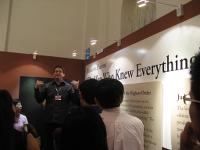
"Dr David Byrd"
He also claimed that Luther had told Tyndale to "create the language" because Middle English had no rules. He also claimed that "everything about Modern English" had been created by Tyndale in translating the New Testament from Greek to English. In reality, while Tyndale did make some contributions*, numerous books on the history of the English Language do not seem to mention him, and Volume 3 of The Cambridge history of the English language mentions him seven times (versus 100 for Shakespeare).
* - "Tyndale is credited with coining such words as 'Jehovah', 'Passover', and 'scapegoat', and such phrases as 'let there be light', 'the powers that be', 'my brother's keeper' and 'the salt of the earth'" --- The History of English / Scott Shay
Certainly, he is not the "Architect of the English Language", despite the attempt of this website (run by the father [Craig Lampe] of one of the exhibition's curators [Joel Lampe]) to spam the web with such references.
Byrd also claimed that 4,000 translations of the King James Bible (KJV) exist, and 1,000 languages exist in written form only as KJV translations. Knowing the fetish that many fundamentalists have with the King James Bible, this was surprising only in scale. Given that the Bible exists in some form in only 2,479 languages (and in totality in only 451), even a charitable interpretation of his claim is untenable (more detailed but older statistics).
After his talk I wandered around a bit. There were quite a few quotes from Luther pinned up. I was disappointed that his classic quote,
Whoever wishes to be a Christian, let him pluck out the eyes of his reason
was not there (I can't find a source for this, but he did also say: "Reason, that pretty whore, comes in and thinks she's wise, and what she says, what she thinks, is from the Holy Spirit, who can help us, then? Not judges, not doctors, no king or emperor, because [reason] is the Devil's greatest whore", which means more or less the same thing).
However, there was this gem on education:
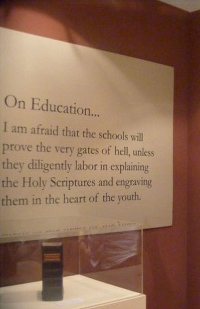
"I am afraid that the schools will prove the very gates of hell, unless they diligently labor in explaining the Holy Scriptures and engraving them in the heart of the youth."
The Geneva Bible was also glorified a lot. However, in this case it *did* have the significance accorded to it.
After the talk was over, I wandered into the chamber where the Dead Sea Scroll fragments were, where I found another talk beginning.
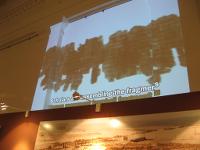
The video playing in the room was subtitled in Malay. HURR HURR
The speaker in this room called the Dead Sea Scrolls "the find of the 20th century". This was debatable (what about King Tut?) but not outrageous, like many of the other claims, but for what it's worth, this was the least contentious of the three talks (which explains why I have nothing else to say about it).
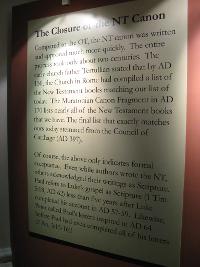
"The Closure of the NT Canon"
This claimed that in 1 Timothy 5:18 (dated to AD 62) "Paul refers to Luke's gospel as Scripture". The latter is dated to AD 57-59.
The passage in question:
"For the scripture saith, Thou shalt not muzzle the ox that treadeth out the corn. And, The labourer is worthy of his reward."
The first line refers to Deuteronomy, but the latter appears in
Wikipedia:
"Many contemporary scholars regard Mark as a source used by Luke (see Markan Priority)... This view also believes that Luke's prediction of the destruction of the temple could not be a result of Jesus miraculously predicting the future but must have been written with knowledge of these events after the fact... These scholars have suggested dates for Luke from 75 to 100. Support for a later date comes from a number of reasons. The universalization of the message of Luke is believed to reflect a theology that took time to develop. Differences of chronology, "style", and theology suggest that the author of Luke-Acts was not familiar with Paul's distinctive theology but instead was writing a decade or more after his death, by which point significant harmonization between different traditions within Early Christianity had occurred. Furthermore, Luke-Acts has views on christology, eschatology, and soteriology that are similar to the those found in Pastoral epistles, which are often seen as pseudonymous and of a later date than the undisputed Pauline Epistles"
This seems a stronger argument than the one arguing for earlier dating (further down in the same entry).
In any event, references to paying the laborer his wage can be paraphrased from the Old Testament: "He that defaudeth the laborer of his hire is a blood-shedder" comes from Ecclesiastes, "Woe unto him... that useth his neighbor's service without wages, and giveth him not for his work" is from Jeremiah and Proverbs reads "The recompense of a man's hands shall be rendered unto him"; this recurring theme appears elsewhere in the Old Testament as well.
Even if you accept the early dating of Luke, it is presumptuous to claim that this is a recognition by Paul of Luke as Scripture (alternatively, it was presumptuous of Paul to make that claim), since there were many gospels and other apocrypha floating around in the first few centuries of Christianity.
Indeed, if you have even some doubt about the early dating of Luke, it is reasonable to postulate that causation runs in the other direction - Luke talks about the labourer and his reward because that is how Paul phrases it.
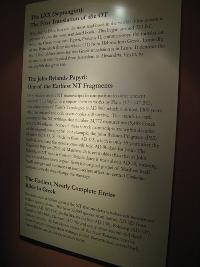
"Small changes and variations in manuscripts affect no central Christian doctrines, nor do they change the message" Again, the claim of Bible accuracy was trotted out, anticipating any objections people might raise based on inaccurate copying. Indeed, small changes and variations are not an issue - the big problems go much deeper.
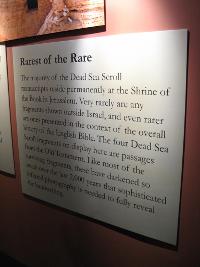
"Very rarely are any fragments shown outside Israel, and even rarer are ones presented in the context of the overall history of the English Bible" They don't have to talk about where -they- got their scroll fragments from, because they're loaned from the Bible Museum in Phoenix but it's a sure-win bet that at least one of them was acquired through less than honourable means. More to the point, why would you need to present Dead Sea Scroll fragments "in the context of the overall history of the English Bible", given that the Dead Sea Scrolls are not in anything resembling English and don't even have half of the modern Bible (i.e. the New Testament)?
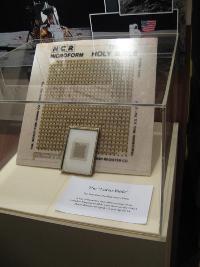
Microform Bible flown on Apollo 13 and 14
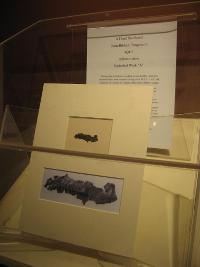
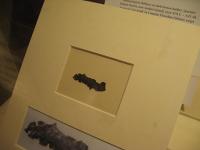
Dead Sea Scroll Non-Biblical Fragment: 4Q418. 4QInstruction Sapiential work "A"
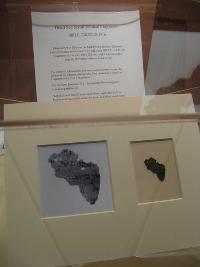
Dead Sea Scroll Biblical Fragment: Bible:Exodus 17:6
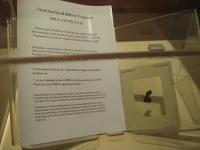
Dead Sea Scroll Biblical Fragment: Bible:Leviticus 23
You will notice that now the Dead Sea Scrolls have become... "the greatest archaeological discovery of all time". Wow.
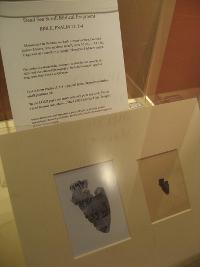
Dead Sea Scroll Biblical Fragment: Bible:Psalm 11:1-4 (sic)
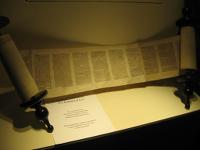
~250 year old Torah scroll
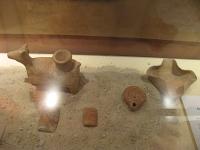
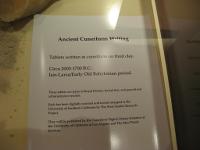
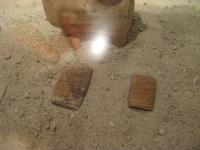
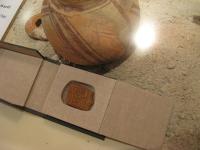
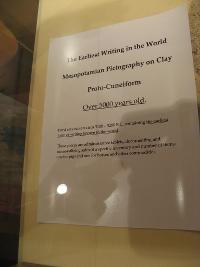
Cuneiform and pottery, from 3200-3100 B.C. and 2000-1700 B.C.
The ancient pottery seemed thrown in as an afterthought, since it has no link at all to the rest of the exhibition. I was half-expecting some nonsensical claim that the Sumerian cuneiform character for "boat" meant "8 people in a vessel".
(To be continued...)